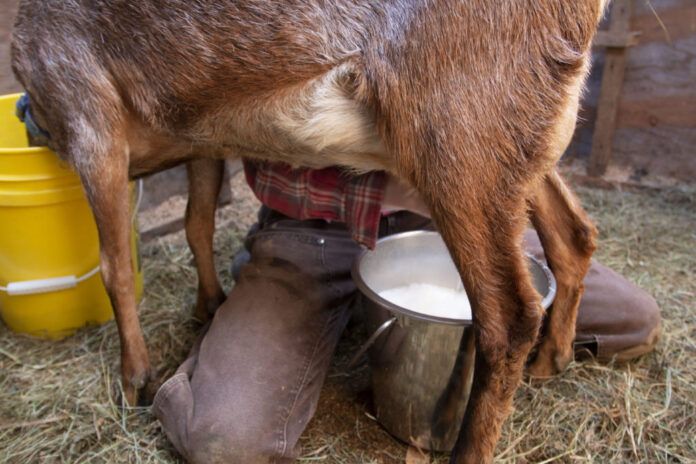Last Updated on October 31, 2023 by Fumipets
15 Goat Breeds For Milk Production
Goat farming for milk production is a widespread practice, and various goat breeds are known for their ability to provide high-quality milk. These breeds have specific characteristics and advantages, making them popular choices for dairy goat farming.
Some of the most renowned milk-producing goat breeds include the Saanen, Nubian, Alpine, LaMancha, and Nigerian Dwarf. Each breed offers distinct qualities, such as milk yield, butterfat content, and adaptability to different climates. Goat milk is prized for its nutritional value, making these breeds valuable contributors to the dairy industry.
Goat Breeds
Compared to cow’s milk, goat milk has higher calcium and protein. Additionally, it improves the body’s ability to absorb a variety of nutrients from other foods and beverages, increasing the effectiveness of your diet as a whole.
It also has a distinctive taste that is sometimes characterized as earthy. Although many people like it, others may find the milk to be excessively rich and the taste to be too distinctive.
In addition, goat’s milk produces delicious cheese, and its high fat content makes it perfect for Greek yogurt and ice cream. Goat’s milk has gained popularity outside of the refrigerator for usage in soap bases, lotions, and even candles.
Choosing the right breed of goat for milk production is essential whether you want to make healthy soap and lotions or appetizing dishes using goat’s milk. Take into account the goat’s typical milk production, her willingness to produce, the length of time she will continue to produce, and if she is readily accessible and suited for upbringing in your location.
Gallons Per Day
A goat breed’s typical daily milk production is shown in gallons, although it should be understood that there are no guarantees. Your goats’ actual output will vary depending on a variety of variables. A Saanen, which is renowned as the most productive milker, can end up producing almost little milk.
Fat Percentage
The percentage of milk that is fat should also be taken into account. Goat’s milk has a comparable proportion to cow’s milk, which naturally contains 3% to 4%. The difference is that goat’s milk contains more medium-chain fatty acids, which are burned for energy rather than being stored as fat.
The Top 15 Goat Breeds for Milk Production
The top 15 goat breeds for milk production are listed below, however keep in mind that milk production is not the only significant aspect. Make sure you can provide acceptable living circumstances and that the breed you chose is suited to your environment. If the goat will be interacting with other breeds, animals, and people, you may also want to think about their traits and temperament.
1. Saanen Goat

Production: 2 ½ gallons/day
Butterfat: 3%
A popular breed of goat in Switzerland known for both its size and milk output is the Saanen. The billy goat breed is popular as a dairy goat breed because it produces both meat and milk, may weigh up to 200 pounds, and is amiable and can be kept as a pet.
2. Nigerian Dwarf Goat

Production: ½ gallon/day
Butterfat: 6% – 10%
With the Saanen, a huge 200-pound breed, we went from one extreme to the other with the Nigerian Dwarf. This kind of dwarf weights around 50 pounds. The Nigerian Dwarf delivers milk with a very high butterfat content even if it only produces a healthy half gallon each day, and because of its small, you may maintain more of them. Additionally, they are amiable and get along well with kids.
3. Alpine Goat

Production: 2 gallons/day
Butterfat: 3.5%
Large in height, the Alpine is a breed similar in size to the Saanen. These robust goats, which were developed in the Alps, thrive in cold weather. They are kind, and they will nearly always produce milk.
4. Anglo-Nubian Goat

Production: 1 gallon/day
Butterfat: 5%
The Anglo-Nubian, often known as the Nubian, is a distinctive-looking goat with floppy ears and a bent snout. It provides around 1 gallon of milk every day, and some have characterized it as being pleasant and rich. The goats may be rather noisy, range in size from medium to giant, and have a lot of activity. Due to their disposition, they may not be appropriate for novice owners or hobby breeders.
5. LaMancha Goat

Production: 1 gallon/day
Butterfat: 4%
In the 1930s, the USA saw the development of the LaMancha breed. The goat is a medium-sized animal, with bucks weighing up to 125 pounds and weighing somewhat less. The LaMancha variety with elf ears yields milk that is very rich in fat.
6. Toggenburg Goat

Production: 2 gallons/day
Butterfat: 3.7%
The earliest dairy breed is said to be this medium-sized breed. The Toggenburg is a vigorous goat, therefore it could need too much attention for inexperienced keepers. They do, however, provide a sizable amount of milk each day—up to 2 gallons—and it has a moderate butterfat percentage of 3.7%, making it acceptable for those who don’t desire the high fat content produced by breeds like the Nubian.
7. Oberhasli Goat

Production: 1 gallon/day
Butterfat: 3.8%
The Oberhasli deer is a lovely creature. They make excellent pack goats and even pets since they are kind and eager to please both their people and the other members of their herd. They have a rich red coat and a black color point, which contribute to their appealing coloration. Approximately one gallon of milk with a moderate butterfat content is produced daily by the Oberhasli.
8. Sable Goat

Production: 2 gallons/day
Butterfat: 3.5%
The Saanen is the ancestor of the Sable. It is somewhat smaller and produces at a little lower pace each day. They thrive better in hot and sunny regions because they have darker skin than the Saanen. They have big ears as well, and people like to breed them because of the variety of colors and patterns.
9. Guernsey Goat

Production: 1½ gallons/day
Butterfat: 3.7%
A small to medium-sized goat, the Guernsey. The Golden Guernsey is the moniker given to this breed because of its well-known gold coloration. Although it is now prohibited to bring the breed into the USA, it can produce up to 1 12 gallons of 3.7% milk daily.
10. Poitou Goat

Production: 1½ gallons/day
Butterfat: 3.5%
Following the Alpine and Saanen breeds in terms of milk production, the Poitou was developed in France. Except for their belly, legs, and tail, which are entirely covered in white hair, they have short, black hair all over.
11. Nordic Goat

Production: 1 gallon/day
Butterfat: 3.5%
Numerous goat species that are indigenous to Norway, Sweden, and Finland make up the Nordic breed. They wear long hair in order to better withstand the chilly and arid climates of the nations. Nordics come in a variety of colors, however brown is by far the most prevalent. They yield around a gallon per day, have a tendency to be a bit distant, and their milk is regarded as having a medium fat level.
12. Malaguena Goat

Production: 1 gallon/day
Butterfat: 4%
A medium-sized goat with a somewhat long coat and a daily milk production of roughly a gallon, the Malaguena is a breed of goat that originated in Spain.
13. American Alpine Goat

Production: 1 gallon/day
Butterfat: 5%
The American Alpine was developed in the early 20th century by combining European Alpine variants with those from the US to produce bigger, tougher animals. The breed may produce up to a gallon of milk each day, but one of the things that make the American Alpine so coveted as a milk producer is that they can go three years without rebreeding.
14. Murciana-Granadina Goat

Production: 1 ½ gallons/day
Butterfat: 4%
The Murciana and Granadina breeds are combined to create the Murcia Granadina. This breed is widely distributed in the USA and Canada because it is a wonderful option for homesteaders and commercial dairy goats since it can breed at any time of the year and produces a lot of milk.
15. Appenzell Goat

Production: 1 gallon/day
Butterfat: 4%
Small to medium-sized Appenzells are an uncommon Swiss breed, with does weighing up to 100 pounds and bucks up to 140. Each day, they produce around one gallon of milk with a medium-to-high fat content. It has been designated as endangered.
Conclusion
The goat breeds that generate a lot of milk are the greatest for milk production. The average yield is influenced by a variety of variables, including the refreshing period. A goat cannot produce milk until after giving birth. Some goats may produce milk for up to a year before they need to freshen, which is when they give birth again. While some common breeds, like the American Alpine, may spend as long as three years without breeding, others, particularly uncommon breeds, can only go two years.
Q&A About Goat Breeds For Milk Production:
Which goat breed is known for its high milk yield?
The Saanen goat is famous for its high milk production, making it one of the top choices for dairy farmers.
What is the butterfat content in goat milk, and does it vary among breeds?
The butterfat content in goat milk varies among breeds. While Saanens have lower butterfat content, Nubians are known for their milk’s richness, with higher butterfat levels.
What is the advantage of LaMancha goats in milk production?
LaMancha goats are known for their consistency in milk production and their adaptability to various climates, making them a reliable choice for dairy farming.
Are Nigerian Dwarf goats suitable for small-scale milk production?
Yes, Nigerian Dwarf goats are ideal for small-scale milk production due to their manageable size, friendly temperament, and high milk yield relative to their body size.
What nutritional benefits does goat milk offer compared to cow’s milk?
Goat milk is often preferred for its digestibility and lower lactose content, making it a suitable option for those with lactose intolerance. It is also rich in essential nutrients like calcium, protein, and vitamins.


















